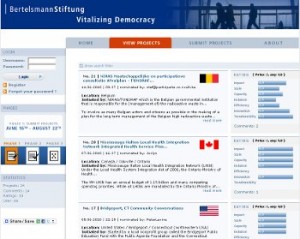Only articles in with the "good practice" tag are displayed
To display all articles click
here.
 |
26. October 2010 – 14:23 by John Heaven (TuTech Innovation GmbH)
|

Photo by mythoto on Flickr
Hands up if you’ve heard the term “Living Lab” and wondered what it means. Now is your chance to find out: PEP-NET has invited some living lab experts from across the continent to take questions on the topic.
On 1st November at 11.00 CET, there will be a one-hour live chat with representatives of Turku University in Finland, Ulster University, Northern Ireland, and Jesse Marsh, special advisor to the President of the Council of the European Living Labs Network.
All panel members (see the list below) are partners in the European Commission-financed PARTERRE project, which is assessing the viability of existing spatial planning consultation services in several European countries outside their countries of origin, and which is adopting a living lab approach to integrate them into one spatial planning consultation service.
So we are lucky to have our Living Lab aficionados in the project, and I have been kind enough to share them with the rest of PEP-NET!
When the chat starts, you will see a box on the “live chats” page (see the tab at the top of the PEP-NET blog). You will be able to participate by entering your questions there. Please note that your questions and comments will not appear immediately, as they are all approved before being published. This enables us to structure the conversation a little bit, ensuring that similar topics are discussed together.
- Tiina Ferm, Senior Lecturer (software engineeering),Turku University of Applies Sciences (TUAS). Tiina is coordinator of TWICT living lab within TUAS and founding member of Turku Innovation Corner (TICo) that coordinates living lab activities in Southwest Finland, founded by Turku University, TUAS, Åbo Akademi (Swedish speaking university) and Novia (Swedish speaking university of applied sciences) and local Science Park.
- Brendan Galbraith, Lecturer, Department of Management, University of Ulster
- Patrizia Hongisto, Senior Researcher, Aalto University School of Economics, Helsinki
- Jesse Marsh, Atelier Studio Association, Italy. Jesse is founder and co-ordinator of the Territorial Living Lab in Sicily, and Special Advisor to the President of the Council of the European Network of Living Labs. He has also published several papers on the topic of regional living labs and territorial innovation.
- Suzanne Martin, Reader, School of Health Sciences, University of Ulster, Belfast
- Maurice Mulvenna, Professor of Computer Science, Faculty of Computing and Engineering, University of Ulster, Belfast
- Olli Ojala, Lecturer, Turku University of Applied Sciences, Turku. Olli has participated in the TWICT living lab and living lab networks in Turku.
- Johnny Wallace, Director of Knowledge and Technology Transfer, Faculty of Computing and Engineering, University of Ulster, Belfast
Posted in Uncategorized | 1 Comment »
 |
28. June 2010 – 12:16 by John Heaven (TuTech Innovation GmbH)
|

Screenshot of vitalizing-democracy.org
As football fans worldwide roar at their televisions, the German Bertelsmann Stiftung is kicking off another prize with arguably more at stake than the World Cup. Has your project found new ways of involving underrepresented citizens? If so, you could be in with a chance of winning the Reinhard Mohn Prize 2011, with prize money of € 150,000!
If you know of a project run by a governmental organisation that deserves to win the Reinhard Mohn Prize 2011, simply visit vitalizing-democracy.org by 22nd August to nominate it. You can also discuss projects that have been submitted so far. By the following phase, which lasts until 6th October 2010, 20 projects will have been selected and you can continue to discuss them on the website. This will be followed by a public consultation before the prize is presented in June 2011 in Gütersloh, Germany. The person who nominates the winning project will be invited to the award ceremony. Read the rest of this entry »
Posted in good practice, inclusion, News, Projects, Uncategorized | 1 Comment »
 |
12. November 2009 – 16:22 by Danish Technological Institute
|
Much focus has been on Web 2.0 technology as an enabler for wider dissemination, awareness raising and not least participation and transparency. It is therefore interesting to see that Web 2.0 technologies are being used in various ways for a range of purposes in this year’s 5th Ministerial eGovernment Conference, 18-20 November, in Malmö (Sweden) and 4th European eGovernment Awards.
Webcast of conference sessions
The plenary sessions and three of the parallel sessions at the Ministerial eGovernment Conference will be webcast live and on demand this year from the conference website www.egov2009.se. In addition the ceremony for the 4th European eGovernment Awards will most likely also be the subject of a webcast.
The programme is available on www.egov2009.se/programme
Twitter flies over Malmö 18-20 November
In addition to RSS feed, Twitter feed is available onthe Ministerial eGovernment Conference website www.egov2009.se. Participants are actively encourage to Twitter about the Informal Ministerial Meeting on eGovernment and the 5th Ministerial eGovernment Conference to use the hashtag #egov2009.
Online vote for European eGovernment Awards Public Prize
Following success of the first online vote in relation to the European eGovernment Awards 2007 in Lisbon (Portugal) the European Commission and the European eGovernment Awards Consortium decided early onto continue practicing what they preach. The objective has been to: increase the visibility and status of public sector ICT projects in Europe; encourage good practice exchange, and; to encourage active involvement and participating in the European eGovernment Awards by the epractice.eu and wider stakeholder communities.
The online voting for the European eGovernment Awards Public Prize was therefore launched late this summer and closed on 11 November at 18:00 CET. Members of the epractice.eu community have been able to vote for their favorite cases from among the 52 European eGovernment Awards 2009 finalists. The online vote is in addition to other ICT initiative by the awards consortium and the European Commission for a fully electronic submission process via www.epractice.eu and the remote evaluation of the received submissions by the jury in the first phase of the evaluation.
The voting is now closed but the 52 finalist cases remain published at ePractice.eu and are open to receive members’ comments. The winner of the Public Prize will be announced at the awards ceremony on 19 November at 18:30 – and likely to the subject of a webcast.
Virtual exhibition
For the first time the European eGovernment Awards finalist are accessible online through a virtual exhibition. The virtual exhibition can be visited on www.expopolis.com (NB: for practical reasons you have to register). Naturally an electronic version of the conference exhibition catalogue will be available on www.epractice.eu/awardsmediakit as of 19 November when the Ministerial eGovernment Conference and Exhibition opens.
Other news
Ministerial tour of European eGovernment Awards Finalist stands
A ministerial tour of the European eGovernment Awards Finalists stands will take place on 18 November 2009 at the Ministerial eGovernment Conference and Exhibition.
Finalist country fact sheets
To enhance the promotion of the European eGovernment Awards Finalists 2009 17 country factsheets from those European countries from which finalists have been selected for the European eGovernment Awards 2009. The factsheets are published in English but will be made available in the relevant national languages in the beginning of November. The fact sheets are available with other dissemination material on www.epractice.eu/en/awardsmediakit
News and background
www.epractice.eu/awards
www.egov2009.se
Danish Technological Institute/Morten Meyerhoff Nielsen – European eGovernment Awards Consortium Partner
Posted in Events, good practice, News, Projects, Tools, Twitter | 1 Comment »
 |
24. February 2009 – 13:43 by Danish Technological Institute
|
Moving a step closer to making the final recommendations for EU level actions the European eParticipation Study’s has just published its second wave of deliverables. The documents are available on www.european-eparticipation.eu (Publication/Public Deliverables section).
The second wave of project deliverables consists of the following eight documents:
• Major factors shaping the development of eParticipation (D1.1b)
• Key actors in the EU in the field of eParticipation (D1.2b)
• Main benefits of the eParticipation developments in the EU (D1.3b)
• Mapping the state of play in eParticipation in the EU (D1.4b)
• Second post-workshop report (D3.2b)
• Framework for eParticipation good practice (D4.1b)
• eParticipation good practice cases (D4.2b)
• eParticipation recommendations second and third version (D5.1c)
The third and final wave is anticipated in May/June 2009 and will take into account comments by the European Commission, the project’s peer review group as well as further work conducted by the consortium partners in the intervening period.
Practicing what it is preaching, the European eParticipation Study, together with PEP-NET, will make use of the eParticipation issues unearth during the project in a joint online consultation 2-13 March 2009 (further information to follow).
Morten Meyerhoff Nielsen, Danish Technological Institute
Posted in good practice, News, Projects | 1 Comment »
 |
14. November 2008 – 17:17 by Danish Technological Institute
|
Dear Colleagues,
Many of you may already know the European Journal of ePractice (EjeP), but do you know that the next special edition is devoted entirely to eParticipation!
The 6th issue of the Journal provides a good chance to write articles based on our work and experiences and provide an excellent opportunity to public, disseminate and most importantly to exchange experiences and ideas.
Launched in November 2007 the Journal belongs to the ePractice.eu community and is sponsored by the European Commission as part of its good practice exchange activity and is run by an independent Editorial Board.
The aim of the Journal is to reinforce the visibility of articles as well as that of professionals while strengthen the overall ePractice.eu activity. The Journal promotes the diffusion and exchange of good practice in eGovernment, eHealth and eInclusion and is available to all potential readers free of charge. The Journal currently has an audience of 50,000 professionals in Europe and beyond, and build on a community of some 14,000 members.
The deadline is 8 December, but I know that the editor for the eParticipation issue Jeremy Millard can be pursuaded to extent the deadline till the second half of December if asked nicely. Relevant links are provided below.
Call: https://www.epracticejournal.eu/info/11
Submission guidelines: https://www.epracticejournal.eu/guidelines
European Journal of ePractice: https://www.epracticejournal.eu/home
Morten Meyerhoff Nielsen
Danish Technological Insitute
Posted in good practice, News | No Comments »
 |
24. September 2008 – 09:29 by Bengt Feil (TuTech Innovation GmbH)
|
On September 15th the Participatory Budgeting Unit, a project by the Church Action against Poverty, organized the first National PB conference in Manchester (UK). For a short introduction to the topic the PB Unit does explain Participatory Budgeting and the reasons why it should be done very well on their website. I was at the event as one of the few non UK citizens and therefore had kind of an outsiders look on what is going on over there. I would like to talk about a few of these impressions.
The first significant fact was that an estimate of 250 representatives of mainly public bodies and councils took part in an event which was focus on what is still a niche topic. This shows that the interest in Participatory Budgeting in the UK is strong and that we can assume that there will be a number of new towns and quarters who start using PB in the next years. I had the opportunity to speak to some of the representatives of cities who already use PB and they were very clear in stating that they will keep up their efforts and that PB has to be a long term process which can not be done “right” at the first try.
Read the rest of this entry »
Posted in Trends, TuTech | 2 Comments »
 |
20. August 2008 – 15:18 by Danish Technological Institute
|
As part of the ongoing eParticipation study eParticipation Study – titled “Study and supply of services on the development of eParticipation in the EU” - for the European Commission (DG Information Society and Media) the following project deliverables has been submitted to the client and now published:
As part of the study’s initial analysis of eParticipation practitioner initiatives in Europe 216 cases from 18 countries and in 29 different languages have been identified to date and are initially available on our project website.
The first of three iterations of eParticipation related recommendations is also available now on our project website. At the end of the study the third and final iteration will provide a set of practical, and intellectually rigorous, recommendations. The recommendations aim to answer and specify (mainly at European level) the following:
-
What should be done by whom?
-
How this may be achieved?
-
Which types of ICT can be used?
-
How other types of media can be involved?
However, rather than attempting to provide recommendations at this early stage of the project, this first iteration pose a number of tentative questions. Questions which reflect some of the main lines of enquiry appropriate to the study and may help frame the final recommendations. The questions have arisen as a result of the work carried out to date and the current report may as a result also serve as a partial overview of the study as it currently stands.
The next wave of deliverables is foreseen for publication in October/Novermber 2008 and will include updates of all current findings. The second version of the deliverables will therefore reflect the further analysis carried out by the Consortium as well as take into account comments made by the project’s Peer Review Group and the European Commission.
All deliverables are available on the publications/public deliverables section of our project website: www.european-eparticipation.eu.
For further and related information please visit www.european-eparticipation.eu or the eParticipation and eDemocracy Network www.epractice.eu/community/eparticipation.
Morten Meyerhoff Nielsen, Business and Policy Analysis, Danish Technological Institute
Posted in Uncategorized | 3 Comments »
 |
1. July 2008 – 15:37 by Danish Technological Institute
|
As you may already be aware the European Commission (DG Information Society and Media) funded eParticipation Study – titled “Study and supply of services on the development of eParticipation in the EU” – is currently underway and in this connection the first wave of deliverable has now been prepared and submitted to the EC and a group of external peer reviewer (see www.european-eparticipation.eu for further details).
Deliverables include:
-
Major factors shaping the development of eParticipation (D1.1a)
-
Key actors in the EU in the field of eParticipation (D1.2a)
-
Main benefits of the eParticipation developments in the EU (D1.3a)
-
Mapping the state of play in eParticipation in the EU (D1.4a)
-
First post-workshop report (D3.1b)
-
Framework for eParticipation good practice (D4.1a)
-
First newsletter (D6.3a)
In addition the following deliverables will be available end of July:
This first wave of deliverables will be updated for the next deliverables wave expected in October/November 2008. The second version of each deliverable will take into account comments by the European Commission and the project’s peer review group as well as further work conducted by the Consortium Partners in the intervening period.
You may view all deliverables in the publications/public deliverables section on www.european-eparticipation.eu or directly on https://195.251.218.37/eP//index.php?option=com_content&task=view&id=39&Itemid=2
Please note that we are continuously looking for people with involvement or experience in eParticipation at the European level who will be able to guide use to relevant eParticipation initiatives, projects, events, etc. We are especially interested in examples at the European level, that may be considered as good practice, or from which lessons can be learned.
If you have not already done so, you may wish to register for the eParticipation and eDemocracy Network on https://www.epractice.eu/community/eParticipation.
Morten Meyerhoff Nielsen, Business and Policy Analysis, Danish Technological Institute
Posted in News, Projects | No Comments »
 |
10. June 2008 – 22:05 by Bengt Feil (TuTech Innovation GmbH)
|

The online consultation in Munich concerning the role of families for the city is a prime example of engaging the public authorities in direct communication with the citizens. A profound learning process on the side of the individuals working for public institutions could be observed. In the course of the discussion there were many cases of direct and productive communication between citizens and public officials which led to a deeper understanding for the issues and attitudes on both sides.
Read the rest of this entry »
Posted in good practice | 2 Comments »
 |
29. May 2008 – 07:48 by christophdowe-politik-digital.de
|
Part of the Pep-Net project is to make good examples of projects more visible. e-participation.net is part of the new european network Pep-Net and collects data about participatory online projects. Is your best practice example included already? Do you know of more examples? To report new examples just fill in the box at the right column – we only need the URL! The data will be delivered to an editor at politik-digital.de where a short description of the website will be written. If you want, you can also send us more information.
The website, built by politik-digital.de and the British Council Germany about one year ago, already consists of a database of about 200 projects. Now its time to include some more examples from other countries! Before launch, the partners had published a short study (PDF) in 2006, comparing the state of the art of e-Democracy in Germany and the United Kingdom (“Facilitating active Citizenship. E-Participation in the United Kingdom and Germany”).
Posted in News, Partners | 4 Comments »










